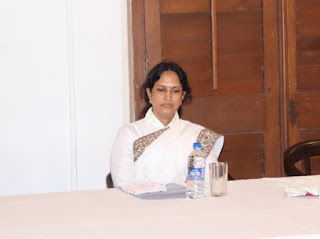After closely analayzing the recent two judgments about sexual assault,SC Withdraw the recommendation of P V Ganedwala
 |
| SC Withdraw the recommendation of P V Ganedwala |
After closely analayzing the recent two judgments of the controversial interpretation of sexual harassment under protection, the Supreme Court has withdrawn its recommendation to appoint Additional Judge of the Bombay High Court, Justice Pushpa V Ganedwala, as a permanent judge of the court. Subject to child abuse from the Sexual Offenses Act, 2012 (Pokso) Act.
The judge will have to be referred to the District Judiciary. From there he was promoted in February 2019 or has a few years of probation - and is more likely to look for the next option.
In the past, the Supreme Court's unique internal process of appointing judges has raised questions about indirect interference - from transparent requests for resignation to the permanence of alternative quasi-judicial appointments - to the conduct of permanent High Court judges.
It is learned that the dissolution of the conference not only set a precedent for the collegium to intervene directly in the judiciary, but also provided a direct precedent for following the judicial recognition of judges when the actions of a judge were closely investigated.
The only issue that was flagged before the Collegium was the quality of the verdicts. There is no question of the judge's competence or integrity. '
On January 19, Justice Ganediwala acquitted a man in a torture case of sexually assaulting a man who touched a baby's breast through clothing without directly touching the skin. Not after sexual abuse under the protection of children from sexual offenses of pressing the wife's breasts on her clothes without skin 'physical contact (Pocso) Act.
Article 8 of Pokso mentions five years of rigorous imprisonment, he said, adding that "hard evidence and serious charges are needed". So the man was ‘convicted of a minor offense under IPC 354 and sentenced to RI,’ the judge said. The maximum sentence for any offense under this section is five years and the minimum is one year, the Supreme Court stayed the order on January 27.
Born in Paratwada, Amravati district of Maharashtra, Justice Ganediwala. Promoted directly to District Judge in 2007. He was a panel advocate for banks and insurance companies and taught at various colleges in Amravati and Amravati Universities.
For appointment as Additional Judge of the Bombay High Court, the name of Justice Ganediwala was first recommended by the High Court in November 2017 and was presented to the SC Collegium in September 2018 along with five more Judicial Officers of the State. The Collegium withdrew his candidacy.
'Respected Mrs. P.V. Ganediwala, the judicial officer, claims that his case has been delayed for some time due to the material on record and all the relevant reasons. The proposal will be accepted for consideration shortly after the Collegium, ’said a statement from the Collegium on September 11, 2018.
The three-member college is made up of the then CJI Deepak Mishra, Justice Ranjan Gogoi and Madan Loku.
The High Court took up the recommendation in January with a collegium comprising former CJI Ranjan Gogoi, former Justice AK Sikri and (then) Justice SA Babade.
This time, on January 16, 2019, the college said: 'Considering all the relevant issues, the college will consider her as Mrs. Judicial Officer PV Ganediwala is fit to be appointed as a judge of the Bombay High Court.
College received two strong notes on the bipartisan conflict between Bombay High Court Justice AM Khanwilkar and DY Chandrachud. Despite all this, the Collegium sends its recommendation and will consider additional judges.
'Even so, the question was the dignity of their decision. Judges appear to have more teaching experience than practice law, "said a source.
Although three senior National Assembly judges, under the direction of CJI, are the body that decides the appointment of judges in HCs, judges with knowledge of a particular Supreme Court's work are consulted about their views.
Additional Supreme Court judges are appointed either by the Lawyers or by the State Court under Article 224 (1) of the Constitution for a period of not more than two years.
The retirement age for additional judges in higher courts is also 62 years. Additional judicial positions under the Constitution aim to address the "increasing burden on the courts" but are increasingly being used as probationary terms for judges before being promoted to permanent judges.
Because, once a judge is appointed as a permanent judge, constitutional immunity protects them from impeachment. According to the Constitution, removing a judge from his position is the only way to remove a judge from the constitutional court.
District judges are subject to the disciplinary jurisdiction of the Supreme Court, but there is no mechanism to oversee the work of permanent judges.
Post a Comment
Don't allow spam link